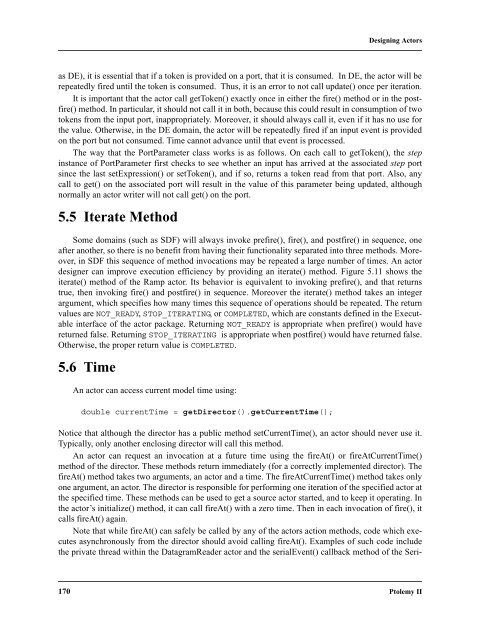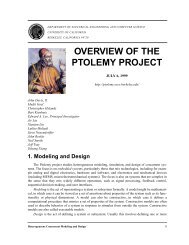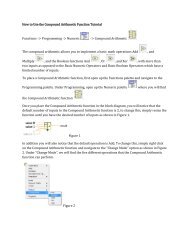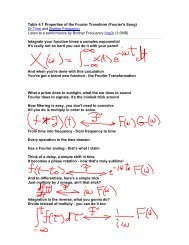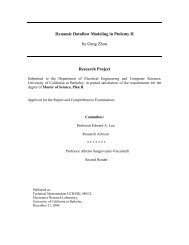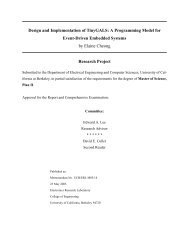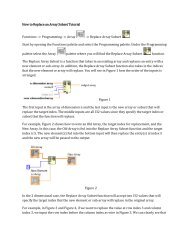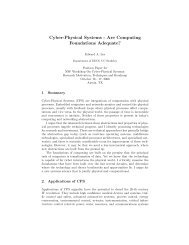PTOLEMY II - CiteSeerX
PTOLEMY II - CiteSeerX
PTOLEMY II - CiteSeerX
Create successful ePaper yourself
Turn your PDF publications into a flip-book with our unique Google optimized e-Paper software.
Designing Actors<br />
as DE), it is essential that if a token is provided on a port, that it is consumed. In DE, the actor will be<br />
repeatedly fired until the token is consumed. Thus, it is an error to not call update() once per iteration.<br />
It is important that the actor call getToken() exactly once in either the fire() method or in the postfire()<br />
method. In particular, it should not call it in both, because this could result in consumption of two<br />
tokens from the input port, inappropriately. Moreover, it should always call it, even if it has no use for<br />
the value. Otherwise, in the DE domain, the actor will be repeatedly fired if an input event is provided<br />
on the port but not consumed. Time cannot advance until that event is processed.<br />
The way that the PortParameter class works is as follows. On each call to getToken(), the step<br />
instance of PortParameter first checks to see whether an input has arrived at the associated step port<br />
since the last setExpression() or setToken(), and if so, returns a token read from that port. Also, any<br />
call to get() on the associated port will result in the value of this parameter being updated, although<br />
normally an actor writer will not call get() on the port.<br />
5.5 Iterate Method<br />
Some domains (such as SDF) will always invoke prefire(), fire(), and postfire() in sequence, one<br />
after another, so there is no benefit from having their functionality separated into three methods. Moreover,<br />
in SDF this sequence of method invocations may be repeated a large number of times. An actor<br />
designer can improve execution efficiency by providing an iterate() method. Figure 5.11 shows the<br />
iterate() method of the Ramp actor. Its behavior is equivalent to invoking prefire(), and that returns<br />
true, then invoking fire() and postfire() in sequence. Moreover the iterate() method takes an integer<br />
argument, which specifies how many times this sequence of operations should be repeated. The return<br />
values are NOT_READY, STOP_ITERATING, or COMPLETED, which are constants defined in the Executable<br />
interface of the actor package. Returning NOT_READY is appropriate when prefire() would have<br />
returned false. Returning STOP_ITERATING is appropriate when postfire() would have returned false.<br />
Otherwise, the proper return value is COMPLETED.<br />
5.6 Time<br />
An actor can access current model time using:<br />
double currentTime = getDirector().getCurrentTime();<br />
Notice that although the director has a public method setCurrentTime(), an actor should never use it.<br />
Typically, only another enclosing director will call this method.<br />
An actor can request an invocation at a future time using the fireAt() or fireAtCurrentTime()<br />
method of the director. These methods return immediately (for a correctly implemented director). The<br />
fireAt() method takes two arguments, an actor and a time. The fireAtCurrentTime() method takes only<br />
one argument, an actor. The director is responsible for performing one iteration of the specified actor at<br />
the specified time. These methods can be used to get a source actor started, and to keep it operating. In<br />
the actor’s initialize() method, it can call fireAt() with a zero time. Then in each invocation of fire(), it<br />
calls fireAt() again.<br />
Note that while fireAt() can safely be called by any of the actors action methods, code which executes<br />
asynchronously from the director should avoid calling fireAt(). Examples of such code include<br />
the private thread within the DatagramReader actor and the serialEvent() callback method of the Seri-<br />
170 Ptolemy <strong>II</strong>


